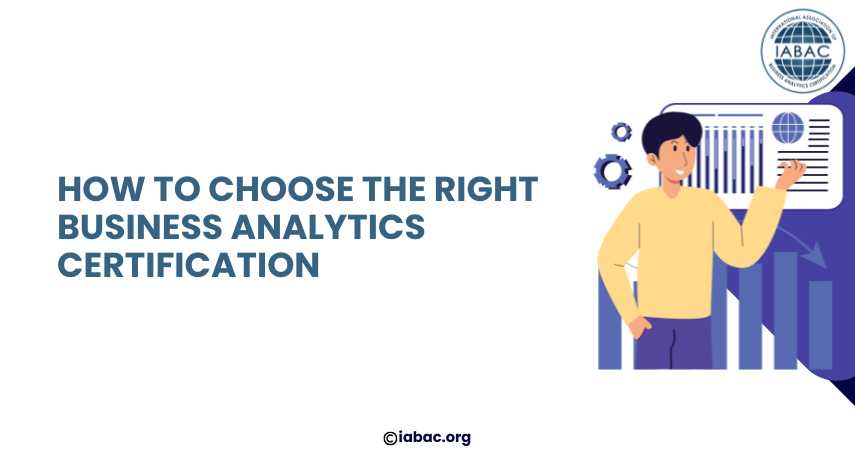


Learn how to choose the right business analytics certification to boost your career, gain practical skills, and stand out in the job market.
Business analytics has grown to be an important skill for workers in a variety of businesses in today’s data-driven world. The correct business analytics certification can make all the difference, whether you are a recent graduate looking to launch your career or an experienced professional looking to move into analytics.
It’s simple to become confused by the hundreds of programs that are offered, including quick online courses to internationally recognized certificates. When selecting the best certification for your objectives, experience, and career path, this post will help you understand what really matters.
It’s important to understand the true meaning of business analytics before pursuing certifications.
The process of using data to improve company choices is known as business analytics. Predictive modeling, statistical analysis, and data collection are all combined to forecast results, identify trends, and improve organizational performance.
To put it simply, it’s about transforming data into insights that help businesses in responding to questions such as:
To conduct this research and provide insights in an understandable, data-driven manner, business analysts use tools including Excel, SQL, Power BI, Tableau, Python, and R.
Here’s how earning a certification can significantly advance your career:
Practical, employable skills like data visualization, data interpretation, and business decision-making with analytics tools are the main focus of certifications.
Certified experts who can use data-driven approaches in practical business problems are often asked by employers. Having an official certification gives your resume more credibility.
Having a certification can facilitate your transfer into analytics roles if you come from a non-technical background (such as marketing, finance, or operations).
Analytics technology is developing quickly. You may stay updated with the newest technologies and techniques by enrolling in certification programs.
Not every certification is made equally. These are the most important factors to consider when choosing the best one for you.
Asking yourself why you want to get this certification is a good place to start.
Are you looking to:
Which certification type is suitable for you depends on your objectives.
For example:
A lot depends on the standing of the company providing the certification.
Select courses offered by internationally renowned or industry-approved universities. Employers around the world are more willing to accept certifications from respectable organizations.
For example, the International Association of Business Analytics certification, or IABAC, provides internationally recognized business analytics qualifications that meet industry requirements.
Professional recognition, current syllabuses, and high-quality training are guaranteed by an effective certification organization.
Both the technical and business sides of analytics should be covered in a quality certification.
Look for programs that include:
Theory and practical experience should be balanced. Be clear about courses that simply discuss tools without describing how to use them in business decision-making.
Different people learn in different ways.
Consider:
Because they strike a mix between structure and flexibility, many professionals favour instructor-led, online certifications.
Your career prospects in business analytics may be determined by the tools you acquire.
Look out for certifications that instruct in-demand tools like:
Analysts are frequently expected by employers to be proficient in at least one programming language and one visualization tool.
Theoretical understanding is not enough.
You can apply what you learn to practical issues with the help of certifications that incorporate case studies or practical projects. These projects can make excellent additions to your LinkedIn page or portfolio.
Verify whether industry-based assignments or a capstone project are included in the programs you are comparing. This is what actually gets you ready for a career in business analytics.
Some industries or geographic regions place a high value on particular certificates.
For example:
Read job descriptions on employment marketplaces or LinkedIn before making a decision. Take note of the certifications that employers bring up; this is an excellent way to determine demand.
Having direction makes learning analytics easier.
Choose programs that offer:
Good mentorship can turn a regular course into a career-changing experience.
Certifications in business analytics can cost anywhere from a few hundred to several thousand dollars.
Avoid constantly choosing the most costly or least expensive alternative. Rather, assess the value you receive:
If a certification helps you land a better job or promotion, it’s worth the investment.
Read feedback from previous participants before registering.
Various analytics certifications are frequently discussed on sites like Quora, Reddit, and LinkedIn. Asking alumni about their experiences can also be done directly.
Ask questions like:
Beyond marketing claims, you get a clear picture from real feedback.
Depending on your objectives, consider the following well-known certifications:
Every qualification has advantages. Your history, professional objectives, and preferred method of learning will determine which one is best for you.
One of the most desired skills of the current decade is business analytics, which connects data with business strategy. Whether you wish to advance in your current position or start over, getting the correct certification can lead to new opportunities.
Consider your goals, the certification body’s reputation, the course material, practical experience, and market recognition before making your decision.
Employers worldwide appreciate the IABAC Business Analytics Certification for its industry relevance and practical approach, making it a solid option if you’re searching for a program that is both globally recognized and career-oriented.
